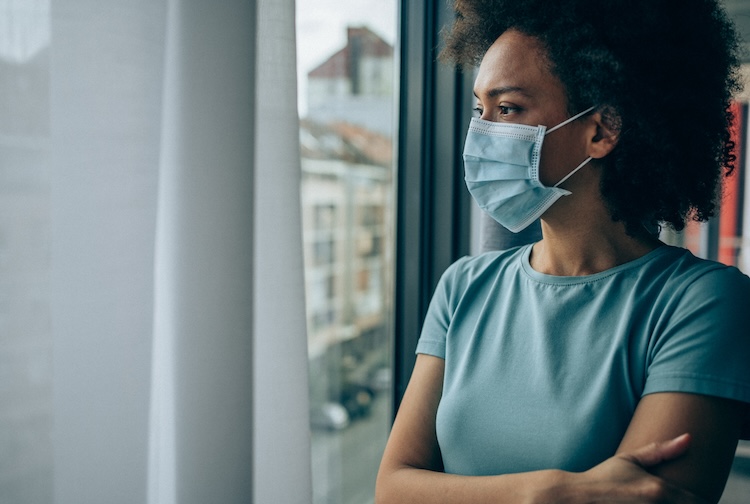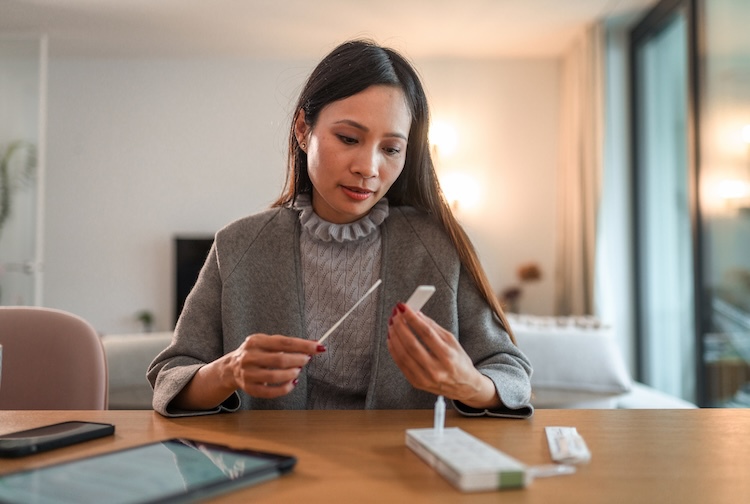
Vaccine myths: Facts vs. fiction
Learn the truth about the COVID-19 vaccines.
April 13, 2021 Photo: Getty Images
Photo: Getty Images
By Esther Benenson
Does the COVID-19 vaccine alter your DNA? Was it rushed through approval, cutting corners when it comes to safety?
Vaccine rumors are plentiful. You hear them from your Uncle Ned, see them on social media and hear them through the grapevine. Here, we respond to some of the most common rumors.
Myth: Vaccine creation was rushed, so the vaccines may not be safe.
In this case, speed didn’t sacrifice safety. The exceptional speed of COVID-19 vaccine development is due to years of prior research on other viruses, including coronaviruses such as severe acute respiratory syndrome (SARS) and Middle East respiratory syndrome (MERS). Scientists weren’t starting their research from scratch.
As for safety, rigorous safety and efficacy standards are set by the FDA for these (and all) vaccines. Each COVID-19 vaccine candidate has had to meet these standards.
Here, in a nutshell, are the reasons behind the extraordinary speed of COVID-19 vaccine development:
- Urgency and prioritization. The record scope and scale of the pandemic created a unique sense of urgency and a shifting of priorities.
- Knowledge gained from previous research. Pharmaceutical companies had already been conducting vaccine research using this technology.
- Thousands tested. More than 70,000 people from diverse backgrounds participated in the clinical trials.
- Production started before formal approval. Because of the urgency of the situation and the evidence supporting vaccine safety and effectiveness, the U.S. government provided funding for vaccine manufacture before FDA approval. This reduced lag time between approval and distribution.
- Emergency use authorization. Scientists needed only two months of post-vaccination follow-up instead of the standard six.
Myth: The mRNA vaccines will alter your DNA.
The technology behind the Pfizer and Moderna vaccines is mRNA. Think of mRNA as an instruction manual for your body on how to make a specific protein — in this case, a small part of the “spike” protein that appears on the virus’ surface. This protein CANNOT cause infection, but it does teach your body to respond to the COVID-19 coronavirus, should you encounter it.
In addition, the mRNA never actually enters the nucleus of your cells, where your DNA resides. Because the two don’t share the same space, the mRNA doesn’t interact with your DNA and therefore can’t alter it. Your cells break down and get rid of the mRNA quickly.
Myth: mRNA vaccines are made with fetal tissue.
mRNA vaccines work by teaching your body how to make a specific protein. This protein triggers an immune response to the SARS-CoV-2 virus, which causes COVID-19. mRNA vaccines don’t contain any live virus, nor do they contain a weakened or inactivated form of the virus. Fetal tissue is in no way used to produce the vaccines.Myth: The COVID-19 vaccines contain a microchip that can track you.
The COVID-19 vaccines don’t contain a microchip. Therefore, they can’t track your movements, collect your personal information or enter anything at all into a database.
This myth took off when Microsoft founder Bill Gates mentioned the creation of digital certificates of vaccine records. The technology he referred to has nothing to do with a microchip. Microchips play no role in the development, testing or distribution of COVID-19 vaccines.
Myth: You can get COVID-19 from the vaccines.
No. You cannot get COVID-19 from any of the vaccines. None of the vaccines approved by the FDA contain the live coronavirus nor do they contain a weakened or dead version of the coronavirus. The vaccines have no coronavirus to pass on to you.
Because it typically takes a few weeks to develop immunity (protection) after vaccination, you could possibly be infected with the virus just before you get vaccinated or right afterwards, before you’re protected. You may think the vaccine got you sick, but it didn’t. You simply hadn’t had time to develop immunity.
Myth: You can suffer a fatal or severe allergic reaction to the vaccine.
As with any medication, some people may experience an allergic reaction to the COVID-19 vaccine. This risk is extremely small. To be on the safe side, health care workers may ask you to remain 15 minutes after your vaccination so they can monitor you for an allergic reaction and take action should one occur.
If you do suffer an allergic reaction, skip the second dose of the vaccine. Also refrain from the vaccine if you’ve ever had a severe allergic reaction to any ingredient in the vaccine. An allergic reaction is considered severe if you require epinephrine or an EpiPen for treatment or you go to the hospital.
You may experience side effects from a vaccine, but these are not the same as an allergic reaction and are not dangerous. Common side effects include pain and swelling in your arm, where you got your shot, as well as fever, chills, fatigue or headache. These side effects are normal and should go away within a few days.
Myth: The vaccine will alter your immune system.
Vaccines work by stimulating an immune response. This immune response disarms an invading virus and protects you from harm. Causing an immune response, however, is not the same as altering your immune system. None of the technologies used in the three vaccines approved by the FDA can alter your immune system.
Myth: If you’ve already had COVID-19, you don’t need to be vaccinated.
We recommend you get the vaccine. Although rare, reinfection is possible. Some experts recommend waiting three months from when you developed COVID-19. This is because you probably have some degree of natural immunity, and the vaccine supply is currently limited. Importantly, it is not clear how long natural immunity will last. If you are in this three-month window, you should discuss the best time to get the vaccine with your doctor. If you’ve had symptoms of COVID-19 but were never diagnosed, don’t assume you had the disease and are immune. Get the vaccine.
Myth: The vaccines will cause autism in children.
This claim stems from a discredited study that linked the measles, mumps and rubella (MMR) vaccine to autism. Unfortunately, this flawed study planted seeds of doubt in many minds. These doubts come up for air with each new vaccine approval. Hundreds of studies across the globe have shown time and again that there is no connection.
Myth: The flu vaccine already helps protect you from COVID-19.
While the flu and COVID-19 share similar symptoms, they are two different illnesses caused by two different viruses. There is no evidence to support the claim that the flu vaccine protects against the coronavirus.
Getting your flu shot is more important now than ever. If you don’t, you could get both COVID-19 and the flu at the same time — weakening your ability to fight either illness. Not only would this further endanger your health, but it could place added strain on our health care system.
Myth: The vaccine will cause female infertility.
This myth stems from a petition filed by Drs. Wolfgang Wodarg and Mike Yeadon in which they state that a protein in the Pfizer vaccine is similar to one that can disrupt placental development in pregnant women, in effect rendering them sterile. This is not the case. The protein in the Pfizer vaccine bears no resemblance to the harmful protein the doctors cite and has no adverse effect on pregnancy.
The key ingredient in both the Pfizer and Moderna vaccines is mRNA. mRNA trains your cells to make a protein that allows your body to learn how to disable the coronavirus. The mRNA and the protein it codes for have no effect on the placenta.
Myth: A female doctor taking part in a vaccine study died.
Social media reports on the death of Dr. Elisa Granato, one of the first participants in the COVID-19 vaccine trials in the United Kingdom, are false. Dr. Granato is alive and well and can be seen on video and her social posts by searching her name. The original report of her death appeared on a site filled with spelling and grammatical errors and is not considered a credible news outlet.
Myth: It’s better to catch COVID-19 to gain immunity.
Vaccines allow you to build immunity without suffering the damaging effects of the disease itself. COVID-19 can cause serious long-term health problems and even be fatal. All of this can be avoided by getting vaccinated. Also, it’s not clear if infection with the virus will lead to immunity, or for how long.
Myth: The virus has mutated, so our vaccines won’t work.
It’s true that new strains of the coronavirus have emerged and are spreading quickly around the world. But viruses mutate all the time. This is not new, nor is it rare.
Our current vaccines may be less effective for certain strains of the virus, but they still offer some protection.
Because it’s so easy to catch the new strains of coronavirus, getting vaccinated and boosted, plus wearing face masks, social distancing, avoiding crowds and frequent handwashing, are still critically important.
Myth: The vaccine will cause Guillain-Barre syndrome (GBS).
The association between Guillain-Barre syndrome and vaccines stems from a small rise in GBS cases following the swine flu vaccinations in 1976. The increase amounted to just one case of GBS per 100,000 vaccinations. Once the increase was discovered, the vaccinations stopped. The association of GBS and vaccines has remained ever since.
When it comes to the flu vaccine, which changes each year according to the type of flu, the number of GBS cases varies from year to year and is extremely small. When an increase does take place, it’s generally 1-2 additional GBS cases per million flu vaccine doses.
So far there is no data linking the COVID-19 vaccines to GBS. Inevitably some cases of GBS will occur while immunity builds following vaccination. This is to be expected based on the number of GBS cases that naturally occur each year. Similar concerns have been expressed concerning Bell’s palsy, but no data linking the disease to the COVID-19 vaccines exists there, either.
Myth: Transplant patients should not get the vaccine.
The COVID-19 vaccines are safe for transplant patients. Transplant patients should receive the vaccine. None of the vaccines approved by the FDA contain the live coronavirus nor do they contain a weakened or dead version of the coronavirus. The vaccines have no coronavirus to pass on to you. You will not be exposed to this virus in any way.
For more information on the COVID-19 vaccines
For a variety of news and information on COVID-19 and how VCU Health is keeping patients safe, please visit our COVID-19 News Center.



